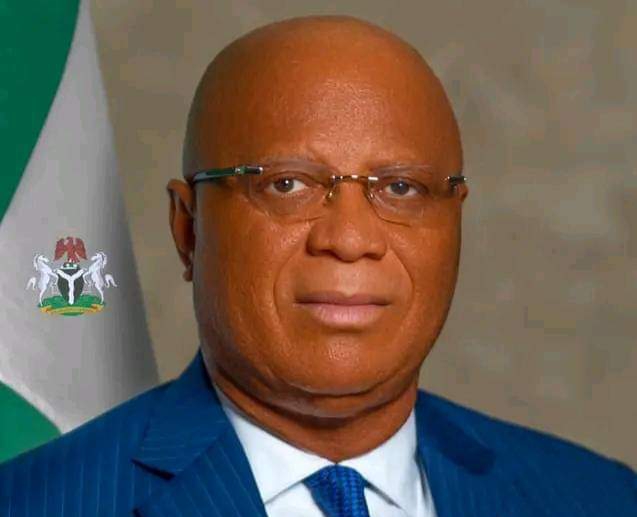Pastor Umo Eno, Governor, Akwa Ibom State.
Abasifreke Effiong
Akwa Ibom State Governor, Pastor Umo Eno, is birthing a new approach to governance. He is increasing personal interactions with citizens of the State at a pace that is unprecedented. There is no week in the the last two months plus that the Governor hadn’t stopped by to patronise petty traders, shake hands with school children, hold impromptu chats with artisans. Photos of these encounters showing broad, affectionate smile on the face of the Governor; anxiety, pleasure, amusement and happiness on the faces of the people as they stretch to receive a touch from their Governor, are beautiful. Those spontaneous and open chats are thrilling. They are creating happy moments and warmth, breaking barriers, inspiring hope and friendship towards the government. Such interactions between citizens and the State are crucial to building trust.
The Governor is making it possible for citizens to contribute to his administration’s agenda and policy direction. He has broadened the scope of civic engagements beyond previous boundaries. Last month, the Governor convened a-3 day dialogue and brought in stakeholders, including aspirants and candidates who contested the 2023 governorship against him in other political parties, and they featured prominently at the event. The policy dialogue chaired by the respected former Minister of Budget and National Planning and legal luminary, Senator Udoma Udo Udoma, aimed to “bring together all strands of thoughts to distil and deepen the layers” of the Governor’s blueprint, called ARISE Agenda.
The dialogue was to get stakeholders to show the government how they want development. “How to do it” was what the Governor wanted stakeholders to decide. Government doesn’t often ask citizens how they want development. The “how” question is always answered exclusively, sometimes arbitrarily, not minding that the non-integration of end users of development into development planning breeds rejection, vandalisation and theft, leading to loss of public resources. There are scores of markets, civic centres and water projects that are abandoned in communities even in the face of dire need because the people were not involved in their initiation and implementation. Citizens who participate in co-creation of solutions and co-production of development have a feeling of sufficient participation in such development. This gives them strong sense of ownership. It engenders accountability and transparency, and enhances their confidence and trust in government. The dialogue was an intelligent and smart public sector innovation. It enhanced participation and inclusion. The co-creation of solutions to development needs of the people and the State by a broad-spectrum of citizens at the dialogue has laid a solid foundation for constructive cooperation between the Eno’s administration and all categories of stakeholders. Onus now is on the Governor to make those ideas work.
Responsive governance is on the rise. The Governor has shown high level of responsiveness to community concerns. The people are enthused about this new attitude. Responsiveness in governance measures how quickly and positively government responds to public issues. Taking action, and how fast the action is taken are indices for rating a decision as responsive. Responsive governance evaluates government’s attitude measured by the level of impartiality, receptivity, feelings, sensibility, kindness, sympathy, compassion, mercy and pity shown by its officials in the course of service delivery. From World Bank documents, responsiveness is one of the eight parameters of good governance. Others are participation, rule of law, transparency, consensus orientation, equity and inclusiveness, effectiveness and efficiency, and accountability. Responsiveness motivates an interrelationship between the government and the people.
READ: Akwa Ibom Internal Revenue holds training on taxation for Judges
In the last two months plus, Governor Eno has responded timely to issues of concern in different communities. His visit to the sites of the perennial flooding on Atiku Abubakar way and gully erosion at Ewet Offot in Uyo, was timely. Peace Point Development Foundation, a civil society which is at the forefront of advocacy for environmental justice, commended the Governor over “responsiveness to Ewet gully erosion”. The foundation in a statement said, “visiting the gully for on-the-spot assessment shows that the Governor is listening and ready to intervene.” The Governor’s prompt condolence visit to Salvation Army and families of members of the church who died in ghastly road crash, just few days after the agonising incident, shown sympathy and responsiveness. Ordering the immediate demolition of new unapproved structures along the expanded Oron road and prevention of further illegal constructions within government’s right-of-way, irrespective of the social status of those who erected those structures, is impartiality.
The Governor is responding to community concerns from the community, not from his office. He goes to the spot of an incident and speaks with the people directly involved. Becky Anderson, the former CNN story-teller and one of my most admired professional inspirators said, “when you speak with the people directly involved, that is when you complete your understanding of the story.” Speaking with people directly affords one the luxury of gathering new ideas that give you a complete understanding of a situation.
The Governor is setting a new order by his responsiveness. He has roused public confidence that government will respond quickly and positively to public concerns and needs of communities. His disposition will surely increase civic engagements from public service organisations like the media, civil society organisations, the academia, etc. The government should anticipate a torrent of engagements. The Columbian government is implementing responsive governance programme with support from the United States Agency for International Development (USAID). Result from the Columbian experience shows that citizens’ confidence and trust built overtime has helped government in public service delivery in conflict-affected municipalities. Responsive administration survives upheavals and still produces winning results.
Now, the State government must take more responsive actions to sustain the goodwill Governor Eno has raked in within this short time. The government must sustain public confidence, and must not let down the budding trust. This will require, top-level political and a whole-of-government commitment. Not just the Governor, everyone working with the Governor in the executive, legislature, judiciary, and at local government councils will have to key into this new order. Commissioners – some of whom did not fancy working from their offices under the last administration – need to dump their old habit and report to duty in their offices, not from hotels. They will need to respond to freedom of information requests and public concerns brought to their knowledge, be it, through letters, mails, SMS, or phone calls. There must be increased willingness to answer the “why” question from citizens. The government must seek to know what is happening. Not waiting to be told. After all, this is a golden era. And so, the format of the courtship must change.
















